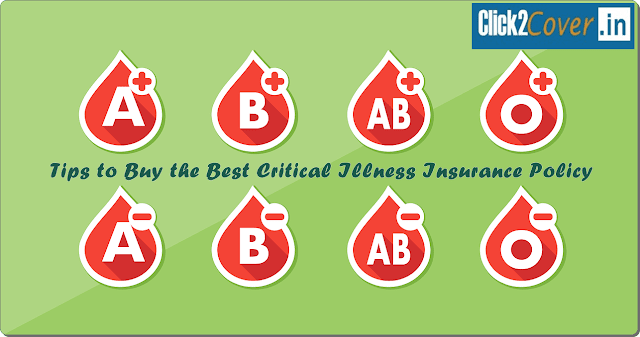Health Insurance plans give you protection
from unexpected financial expenditure that arises due to sudden illness,
accidents and other health related issues. The coverage and policy premiums
vary based on different parameters like age, gender, family medical history,
basic health and habits of the policy holder and locational or occupational
hazards, if any. Health benefits could be extended over the basic health insurance
plan by certain add-on in excess to the base policy as required by individual
need and preference.
Health
Insurance Policies Types
In India, health insurance is broadly
classified under 3 types:
·
Critical illness policy -- This is
different from general health insurance
policy since only certain pre-specified illnesses are covered under critical
illness policy rather than more general health and accident coverage. Moreover,
the lump sum amount is paid to carry out treatment once
the diagnosis is done decisively. General health insurance does not include
certain diseases and to overcome this shortcoming, there is the need to buy the
critical illness cover policy. This is an add-on or rider on top of your
general health insurance policy. Some of the most common critical illnesses
that are covered under this plan are heart attack, stroke, cancer, blindness,
terminal illness, paralysis, organ transplant etc.
·
Hospitalization plans – This plan covers
the medical and hospitalization costs of the insured. Coverage is up to the sum
insured. Based on the person(s) insured under the policy, the plan can extend
to single individual, all individuals in the family separately or as a family
floater. For example, for a family of 4 people, there can be 4 individual health
insurance policies of 1 lakh each. Or there can be a family insurance plan of 4
lakhs where each member is insured up to 1 lakh individually. They might have a
family floater plan of 4 lakhs where any and all members can use any amount not
exceeding a total of 4 lakhs for the entire family.
·
Daily Cash benefit plan for hospitalization – Here the insured will receive an agreed up on daily payment
irrespective of the actual cost incurred during the time the person is
hospitalized. If the daily pay-out is more than the actual cost of
hospitalization, that works as an added income or benefit for the insured.
While
shopping for a critical illness policy you need to look for the following:
·
Current Financial situation – Do a
homework regarding your financial position. If you can afford to face the
financial challenges in case there is a critical illness, then you can go for a
smaller coverage under critical illness plan. Also, keep in mind that health
related expenditure are always on an upward move, so health insurance plan
should be done accordingly.
·
Current health situation– Your present
health condition will matter when it comes to shop for critical illness
policy. Obesity, unhealthy habits of
smoking and drinking pose higher risk and exposure to certain critical illnesses
in future. And these add to the cost of premium exactly the same way it does
for general health insurance. Taking critical cover plan early in life when you
are healthy is a better idea.
·
Current Family Set Up – If there are
senior citizens or aging parents in your family, it is imperative to get
covered under Critical illness policy since there is higher chance that health
emergency can occur and put a financial burden on you.
·
An add-on that will complement the general health Insurance policy – Your Critical illness policy should be complementing the general
health Insurance plan that you already have so that when both combined, they
optimise the coverage. That becomes most cost effective.
·
Go for a more comprehensive coverage –
Shop for the different Critical Illness plans offered by different insurers.
The list of covered illnesses varies. Make sure the plan offers the coverage
for most critical illnesses. Also the terms and conditions are important to
understand the inclusions and exclusion.
·
Look for Claim Settlement Ratio and No Claim Bonus – The higher the percentage of the claims settlement by the
insurer, the better is your chance of getting reimbursed for your illness
cover. Moreover, on a particular year, if there is no claim, then some insurers
reward you with certain percent of premium. While looking for a policy, look
for these from the insurer.
S

